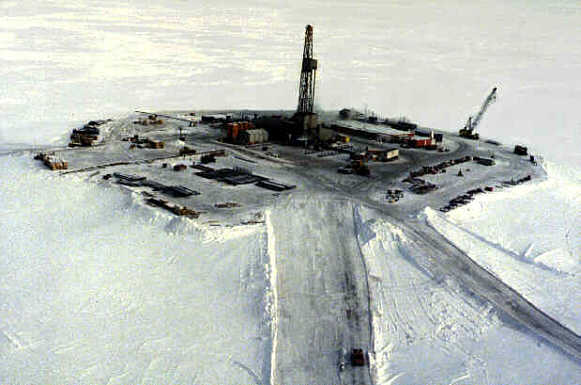
Jayne is in 12th grade and this is her second year in Journalism. She loves to cook, bake, and read. She hopes to become an international travel nurse.

An oil drilling platform in Alaska. Photo Courtesy of Luca Galuzzi – www.galuzzi.it, under the Creative Commons Attribution-Share Alike 2.5 Generic License
April 17, 2023
On March 13, the Biden administration approved the controversial Willow project, a massive oil-drilling venture on Alaska’s north slope in the National Petroleum Reserve. The government believes this could produce more than 600 million barrels of oil.
It took several years to get this project approved, and doing so caused an uproar by activists, with more than four million signatures on a Change.org petition against the project.
“The difficult decision was on what we do with the Willow Project in Alaska, and my strong inclination was to disapprove of it across the board,” Biden told reporters.
The drilling project will be conducted by ConocoPhillips, an energy-based company from Houston, Texas. Currently, they are the only ones who have oil drilling operations in Alaska. The Willow Project actually started in 2020 when it was approved by the Trump administration. Initially, they were told they could have five drilling pads, but the Record of Decision (TRD) denied two of the five drill site pads proposed by ConocoPhillips, reducing the output of what the oil company had hoped for by 10%.
This reduces the project’s freshwater use and eliminates all infrastructure related to the two rejected drill sites, including approximately 11 miles of roads, 20 miles of pipelines, and 133 acres of gravel, all of which reduces potential impacts to caribou migration and subsistence users. Three pads will allow the company to drill about 90 percent of the oil they hope to extract.
Since the Biden administration has approved the project, we can expect to see the construction starting soon. However, we are not sure when because of the legal aspects of the Willow Project. We can plan on seeing multiple environmental companies suing the Biden administration because they approved what some believe to be a very harmful project. We do know that the construction can only happen in winter because the workers will need extreme cold to make the roads passable to get to and from the site. Many environmental groups, such as Earthjustice, are beginning to file complaints against the project due to its potential impact on the environment.
Some people support the Willow project, noting it could create thousands of jobs and boost American energy production, thus reducing the nation’s reliance on foreign oil. Many Alaskans and native Alaskan tribes agree that the Willow Project is a positive thing.
“Willow presents an opportunity to continue [our] investment in the communities,” said Nagruk Harcharek, the President of Voice of the Arctic Iñupiat, told CNN. “Without that money and revenue stream, we’re reliant on the state and the feds,” he added.
On the other side of the controversy is the millions of people against the Willow Project. By the Biden administration’s own estimates, the project would generate enough oil to release 9.2 million metric tons of planet-warming carbon pollution a year. According to CNN, this could be the equivalent of adding two million gas-powered cars to the roads. Some point out that the Biden administration had promised to fight climate change, and that approving this project would do the exact opposite.
“This is a huge climate threat and inconsistent with this administration’s promises to take on the climate crisis,” said Jeremy Lieb, an Alaska-based senior attorney at environmental law group Earthjustice.
The Biden Administration says it has no plans to reduce the amount of pollution that’s generated from the Willow Project. They see it has a profitable plan rather than what it actually is: a disaster to our earth. While domestic oil is much cheaper and easier to access than relying on foreign oil, would we rather risk damaging our earth than paying more for foreign oil?

Jayne is in 12th grade and this is her second year in Journalism. She loves to cook, bake, and read. She hopes to become an international travel nurse.